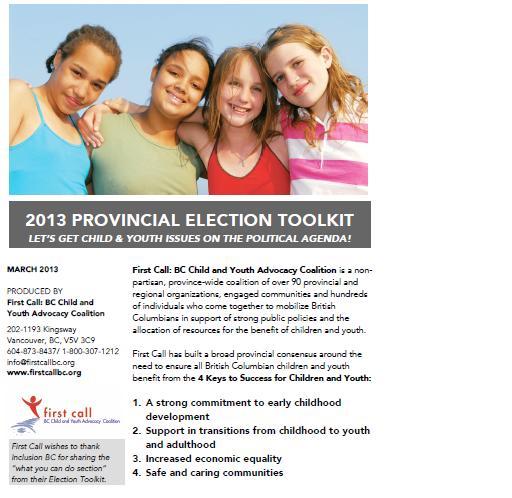WHAT YOU CAN DO
Community groups, organizations and individuals can all play a role in putting child and youth issues on the election agenda by engaging in activities such as:
- Sharing First Call’s Election Toolkit and materials.
- Contacting local candidates and seeking support for our issues.
- Assisting others to learn about the election process and exercise their right to vote.
- Providing feedback to First Call on meetings with candidates and local coverage about child and youth issues.
- Building working relationships with other community organizations through information exchange and joint activities.
- Voting and reminding your friends and family to vote!
The media momentum that builds during an election period offers an excellent opportunity to bring our issues forward and to seek both public and political party support. The activities posted below provide some ideas about how to bring our issues forward and ensure that the broader community becomes more aware of the needs of children, youth and their families during the election campaign.
MEET WITH INDIVIDUAL CANDIDATES
Meeting with individual candidates is an opportunity to let the candidates know who you are and how they can best support children and youth and their families.
- Call the candidate’s campaign manager, or your MLA’s constituency office if the nominated candidate is currently a government member.
- Introduce your group or organization and ask for a brief meeting to outline your issues and hear their positions.
- Have a pre-meeting with your team to decide the issues you want to bring forward, what questions to ask, etc. You can use the 4 keys and the questions in this toolkit as a guide.
- Offer background information on the work of your group or organization and the other community resources needed to support children and youth and their families.
- Keep notes, leave information and be non-partisan in your approach.
- Try not to leave without some form of commitment to our issues. As we prepare to work with a new government and new MLAs, it will be very helpful to have some foundation of support upon which to build a post-election strategy.
- Send a brief thank you letter to the candidate with your appreciation for any agreements reached during the meeting.
USE SOCIAL MEDIA
There are many things you can do at your computer, while you’re using online social media tools like Facebook, or reading and writing on blogs. Most party leaders and MLAs have Facebook pages where you can send them messages or write on their “wall” and most online newspapers have blogs where you can voice your opinions and concerns about an election story in the news.
INVOLVE YOUR NETWORKS, MEMBERS AND SUPPORTERS
Send this election package and any other material to colleagues, clients, friends and family. If you work for an organization, link it from your website and post it where you can. Get together with others in the community and host a meeting to prepare people to speak to their candidates on their door-steps, in individual meetings, and at all candidates meetings. The 4 keys in this toolkit provide a description of key issue areas and questions to ask candidates.
ATTEND AN ALL CANDIDATES MEETING
Attending all candidates meetings in your community is a powerful way to promote child and youth rights. Asking questions in this public forum increases the visibility of children and youth and their families, and invites the community to understand and support our issues. All candidates’ forums may also be held on-air by local television and radio stations. If they welcome callers, encourage your networks to phone in with questions. If the forum will not have an open question period, contact the station ahead of time and request for the host to ask a question on an issue that’s important to children and youth in your community.
HOW TO PREPARE FOR AN ALL CANDIDATES MEETING
- Organize a meeting of your group, network or organization to brief them and discuss questions that can be raised at all candidates meetings. (See the 4 keys for facts and questions.)
- Secure volunteer commitments to attend all candidates meetings and ask questions.
- As local media may attend all candidates meetings, approach them and offer to provide introductory information, comments on your issues, etc.
- Be prepared to talk to local media about issues raised during the meeting or issues you believe should have been raised.
HOW TO ORGANIZE AN ALL CANDIDATES MEETING
- It is a good idea to work with other organizations in your community. All candidates meetings are a lot of work, and candidates will be more attracted to forums that guarantee a large audience.
- Given the 28-day election period, secure a time and place as early as possible.
- Contact the candidates’ campaign managers and secure a commitment.
- Strike a small organizing committee to deal with site preparation, publicity, meeting format, securing a moderator for the event, etc.
- Establish a candidate liaison person to assist candidates’ arrival and departure and ensure each candidate receives information from your organization.
- Afterwards, send a thank you letter to candidates and additional information you wish to provide.
CONTACT LOCAL MEDIA
- Contact your local radio and/or television stations to find out how they will be covering the election and whether there will be opportunities for public involvement.
- Monitor the media and use letters to the editor, feedback phone lines, etc. to raise and respond to issues important to you.
- Make yourself available to the local media and assist spokespersons to raise key issues.
